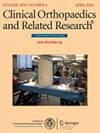Patients With Moderate to Severe Dementia Who Undergo Elective TKA Face Elevated Risks of Death, Delirium, and Intensive Interventions: A Large, Propensity-weighted Database Study.
IF 4.2
2区 医学
Q1 ORTHOPEDICS
引用次数: 0
Abstract
BACKGROUND Although TKA is one of the most commonly performed and successful orthopaedic interventions, its efficacy may be reduced in individuals living with dementia. Prior studies have not effectively accounted for confounding by indication or the use of intensive interventions, or considered the fact that cognitive impairment exists on a continuum and that patients with mild dementia may have different risk profiles when compared with those with moderate to severe dementia. QUESTIONS/PURPOSES (1) Are there differences in the risk of death after TKA in patients based on the severity of dementia? (2) Are there differences in intensive interventions and delirium after TKA in patients based on the severity of dementia? METHODS We used Medicare data to allow for complete surveillance of all medical encounters and events that transpired before and after TKA surgery. We retrospectively identified Medicare beneficiaries living with dementia who underwent primary elective TKA between January 1, 2017, and June 30, 2018. We used the Claims-based Frailty Index (CFI) to stratify dementia severity. Patients with CFI scores of 0.25 to 0.28 and an ICD-10 code for dementia were recorded as living with mild dementia. Patients with an ICD-10 code for dementia and CFI scores of ≥ 0.28 were classified as having moderate to severe dementia. Our cohort included 156,596 patients, with 98% (152,728 of 156,596) classified as not having dementia, 1% (2123 of 156,596) having mild dementia, and 1% (1745 of 156,596) having moderate to severe dementia. We had complete surveillance of outcomes and events after surgery for this cohort of patients. The primary outcome was death within 180 days of surgery. Intensive interventions (such as feeding tube insertion, intubation, resuscitation) and delirium were considered secondarily. We used inverse probability weights to account for confounding and compared outcomes between cohorts using Cox proportional hazards models, generalized estimation equations, and Fine and Gray models. RESULTS After adjusting for potentially confounding variables such as age, gender, and comorbidities, we found that individuals with mild dementia (HR 1.74 [95% confidence interval (CI) 1.12 to 2.70]; p = 0.01) and moderate to severe dementia (HR 3.05 [95% CI 1.80 to 5.17]; p < 0.001) both demonstrated elevated hazards of death compared with patients without dementia. Patients with mild dementia (HR 4.25 [95% CI 2.59 to 5.03]; p < 0.001) and moderate to severe dementia (HR 6.40 [95% CI 5.18 to 7.92]; p < 0.001) exhibited elevated hazards of delirium, and those with moderate to severe dementia were found to have greater hazards of one or more intensive interventions (HR 3.24 [95% CI 1.76 to 5.96]; p < 0.001). CONCLUSION We observed elevations in the risk of death and delirium in patients after TKA, irrespective of the severity of dementia and marked elevations in the likelihood of intensive interventions after surgery for those with moderate to severe dementia. We believe that TKA in patients with mild dementia should only proceed after clear communication about the increased risk of death, as well as effective management of chronic medical conditions and prophylactic enhancement of cognitive reserves. Performing TKA in patients with moderate to severe dementia might only be indicated in exceptional humanitarian circumstances. LEVEL OF EVIDENCE Level III, therapeutic study.接受选择性TKA的中重度痴呆患者面临死亡、谵妄和强化干预的高风险:一项大型倾向加权数据库研究。
背景:虽然TKA是最常用和最成功的骨科干预措施之一,但其在痴呆症患者中的疗效可能会降低。先前的研究没有有效地解释适应症或使用强化干预的混淆,也没有考虑到认知障碍是连续存在的,并且轻度痴呆患者与中度至重度痴呆患者相比可能具有不同的风险概况。问题/目的(1)基于痴呆严重程度的患者TKA后死亡风险是否存在差异?(2)不同痴呆程度的患者TKA后强化干预和谵妄是否存在差异?方法:我们使用医疗保险数据对TKA手术前后发生的所有医疗事故和事件进行全面监测。我们回顾性地确定了2017年1月1日至2018年6月30日期间接受初级选择性TKA的老年痴呆症医疗保险受益人。我们使用基于索赔的衰弱指数(CFI)对痴呆严重程度进行分层。CFI评分为0.25至0.28,ICD-10痴呆代码的患者被记录为轻度痴呆。痴呆ICD-10编码且CFI评分≥0.28的患者被归类为中度至重度痴呆。我们的队列包括156596例患者,其中98%(152728 / 156596)为无痴呆,1%(2123 / 156596)为轻度痴呆,1%(1745 / 156596)为中度至重度痴呆。我们对这组患者手术后的结果和事件进行了完整的监测。主要结局是手术后180天内死亡。强化干预(如插入饲管、插管、复苏)和谵妄被认为是次要的。我们使用逆概率权重来解释混杂因素,并使用Cox比例风险模型、广义估计方程以及Fine和Gray模型比较队列之间的结果。在调整了年龄、性别和合并症等潜在的混杂变量后,我们发现轻度痴呆患者(HR 1.74[95%可信区间(CI) 1.12至2.70];p = 0.01)和中度至重度痴呆(HR 3.05 [95% CI 1.80 ~ 5.17];P < 0.001),两者均显示与无痴呆患者相比死亡风险升高。轻度痴呆患者(HR 4.25 [95% CI 2.59 ~ 5.03];p < 0.001)和中度至重度痴呆(HR 6.40 [95% CI 5.18 ~ 7.92];p < 0.001)表现出谵妄的风险升高,中度至重度痴呆患者被发现有更大的风险进行一次或多次强化干预(HR 3.24 [95% CI 1.76至5.96];P < 0.001)。结论:我们观察到TKA后患者死亡和谵妄的风险升高,与痴呆的严重程度无关,对于中度至重度痴呆患者,术后强化干预的可能性显著升高。我们认为,轻度痴呆患者的TKA只有在明确告知死亡风险增加、有效管理慢性疾病和预防性增强认知储备后才能进行。只有在特殊的人道主义情况下,才有可能对中度至重度痴呆症患者实施TKA。证据等级:III级,治疗性研究。
本文章由计算机程序翻译,如有差异,请以英文原文为准。
求助全文
约1分钟内获得全文
求助全文
来源期刊
CiteScore
7.00
自引率
11.90%
发文量
722
审稿时长
2.5 months
期刊介绍:
Clinical Orthopaedics and Related Research® is a leading peer-reviewed journal devoted to the dissemination of new and important orthopaedic knowledge.
CORR® brings readers the latest clinical and basic research, along with columns, commentaries, and interviews with authors.

 求助内容:
求助内容: 应助结果提醒方式:
应助结果提醒方式:


